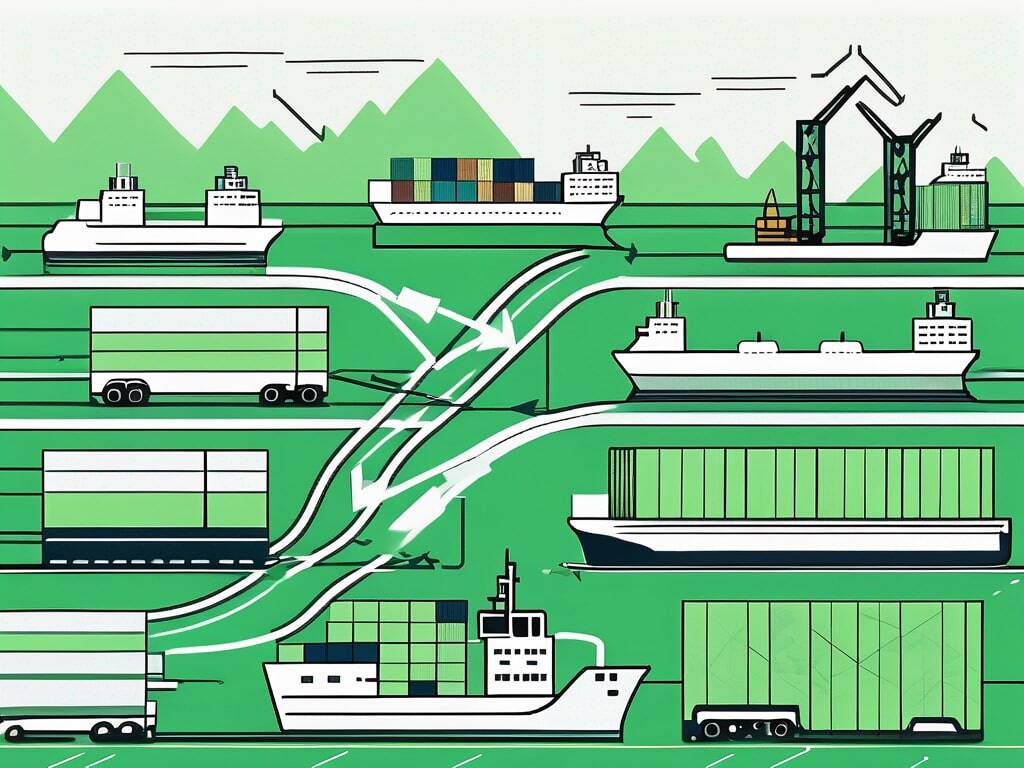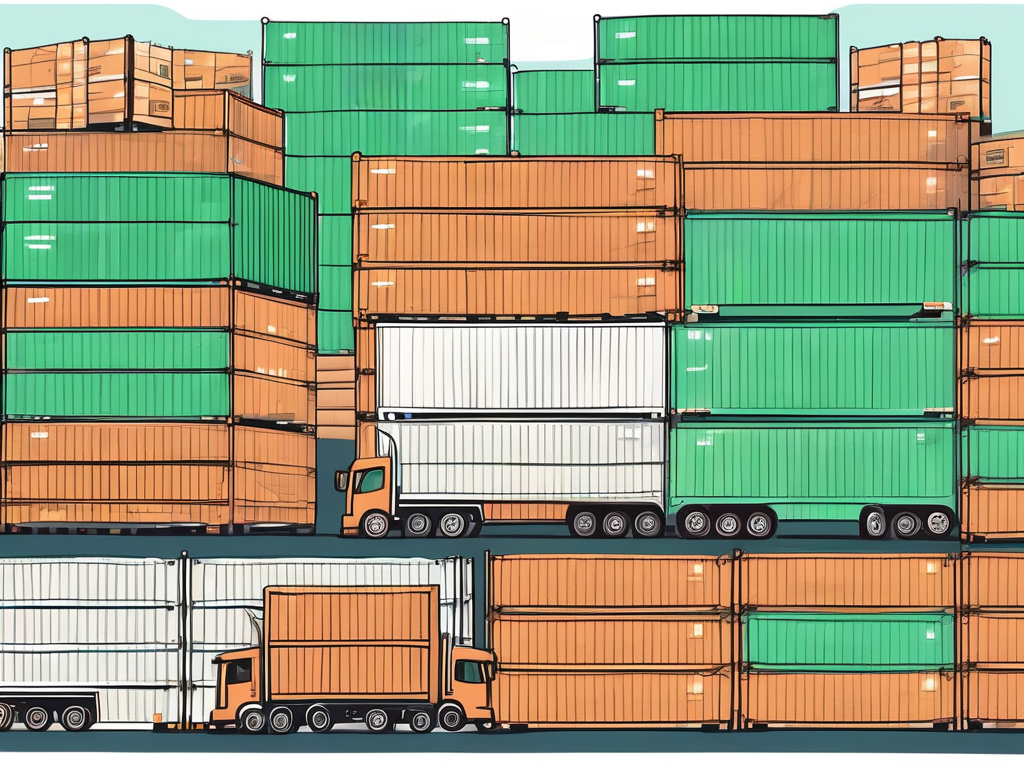Share this
What to Know Before Working with a B2B Shipping Company
by Shipfusion Team on Nov. 5, 2024

Navigating B2B shipping brings unique complexities and opportunities, distinctly different from the familiar B2C landscape. B2B shipments often involve larger volumes, long-term relationships, and specialized logistics.
For ecommerce businesses, understanding these nuances is key to building a resilient supply chain that balances cost-efficiency with reliability and flexibility. From handling bulk shipments to leveraging technology for real-time visibility, a specialized B2B shipping company can streamline operations and elevate a company’s ability to meet demand seamlessly.
What Makes B2B Shipping Different from B2C Shipping?
B2B shipping, or business-to-business shipping, refers to the transport of goods between two businesses rather than from a business to a consumer. This shift in purpose creates critical distinctions in shipping logistics and relationship management. In B2B/wholesale fulfillment, shipments are generally larger, often in bulk or full container loads, requiring special handling and optimized freight planning to meet business needs.
The relationship framework also differs significantly. B2B shipping is frequently governed by established contracts that define service levels, payment terms, and delivery expectations. This setup creates predictability in logistics, allowing businesses to plan more effectively than in B2C environments, where transactions are often one-time and transactional. With reliable agreements in place, companies can depend on steady delivery schedules, which helps avoid interruptions to production or inventory flow.
Navigating the Complexities of B2B Shipping Networks
One of the key challenges in B2B shipping is managing a complex network of suppliers, manufacturers, and distributors. Unlike B2C models that typically involve direct shipping from a business to an end-consumer, B2B transactions often require multiple touchpoints across the supply chain.
For instance, consider a business in electronics manufacturing. Such a company may need to source components from different suppliers, transport them to an assembly plant, and then distribute finished products to various wholesale clients. Each point in this chain presents specific challenges, from aligning delivery times with production schedules to adhering to customs regulations when shipping internationally.
In such scenarios, real-time tracking and communication become essential. Any disruption in one part of the chain can cascade, affecting the entire supply line. With the ability to monitor shipments at every stage, businesses can address potential delays proactively, keeping production schedules intact and maintaining customer satisfaction.
Key Differences In Shipping Volume, Freight, and Lead Times
Shipping volume plays a critical role in B2B logistics. In B2B shipping, orders are often large and shipped in bulk, which influences freight management and offers cost-saving opportunities through economies of scale. A B2B order may consist of several pallets or even full truckloads, contrasting with B2C shipments typically involving individual items or small packages.
Lead times also differ significantly. B2B transactions often demand shorter lead times, especially in industries where inventory levels are closely tied to production schedules. By leveraging technology, including automated inventory systems and predictive analytics, B2B companies can anticipate demand fluctuations, plan shipping accordingly, and reduce the chances of costly delays. A tech-forward approach improves both efficiency and partnership strength, as businesses can rely on real-time data to make informed decisions about shipping and inventory management.
How Can a B2B Shipping Company Improve Your Supply Chain?
For businesses aiming to streamline their supply chains, collaborating with an experienced B2B shipping company brings a host of benefits. Effective management of shipping logistics not only enhances operational efficiency but also contributes directly to better customer satisfaction by minimizing delays and ensuring reliability.
A capable B2B shipping partner can minimize bottlenecks with advanced routing software, inventory tracking systems, and optimized load planning. For example, with real-time visibility into shipment locations and statuses, businesses can monitor each part of the supply chain, quickly resolve issues, and keep operations running smoothly. This level of visibility is essential for making informed decisions, whether adjusting inventory on the fly or updating customers with accurate delivery times.
Optimizing Freight Costs and Delivery Times for Bulk Orders
Working with a B2B shipping company offers the advantage of reduced freight costs due to economies of scale. Bulk shipments allow shipping companies to consolidate loads, optimizing routes and transport modes to maximize efficiency. This can significantly benefit sectors like manufacturing and retail, where cost management is paramount.
Moreover, by streamlining delivery schedules, B2B shipping partners can ensure that bulk orders arrive on time without unnecessary expenses. Established relationships with carriers enable them to select efficient routes and balance speed with cost, providing businesses with favorable delivery timelines that support their bottom line. Predictive analytics tools further refine this process, allowing companies to adapt shipping strategies proactively based on anticipated demand, thus avoiding unexpected delays or surcharges.
Enhancing Flexibility with Custom Shipping Solutions
Every business has unique shipping needs, which makes flexibility indispensable in B2B logistics. The right shipping partner will offer tailored solutions that align with specific operational requirements. For instance, businesses dealing in perishable goods require refrigerated transport, whereas those handling industrial machinery might need specialized equipment for loading and unloading.
A proficient B2B shipping company can accommodate these diverse requirements, enhancing the supply chain’s overall efficiency. Additionally, services such as warehousing and inventory management can add value by centralizing operations under one provider. This integration reduces lead times and enables businesses to respond more effectively to market demands, creating a more agile and competitive supply chain.
How to Choose the Right B2B Shipping Partner for Your Business
Choosing the right shipping partner is a crucial decision that directly impacts a business's operational success and customer satisfaction. Thoroughly assessing potential partners ensures alignment with your specific shipping needs and business goals.
Start by examining factors such as experience in your industry, technological capabilities, and service history. Feedback from existing clients and performance metrics can provide insight into a partner’s reliability. Understanding their ability to handle specific challenges – like seasonal fluctuations or unexpected disruptions – can give a business the confidence that the logistics partner will maintain consistency and dependability in complex scenarios.
Shipfusion, for example, brings industry-specific expertise to the table, addressing unique logistics requirements and delivering high reliability for B2B operations.
The Importance of Real-Time Tracking and Communication
Transparent communication is a cornerstone of effective B2B shipping. Real-time tracking capabilities allow businesses to monitor shipments at every stage, offering essential insights into delivery timelines and inventory management.
Proactive communication from shipping partners, especially regarding potential delays, helps prevent minor issues from becoming major disruptions. By leveraging advanced tracking technologies like GPS and IoT devices, businesses can gain even greater visibility into shipment locations and conditions.
This level of insight supports better decision-making, which is particularly valuable in industries with strict timelines and sensitive goods, such as pharmaceuticals or perishables. When a shipping partner demonstrates commitment to proactive communication, it builds trust and contributes to a more resilient supply chain.
Why Shipfusion Is the Right B2B Shipping Company for You
Selecting the right B2B shipping partner can transform a business’ supply chain resilience, efficiency, and customer satisfaction. By partnering with a provider that understands the complexities of B2B logistics – from freight forwarding to real-time tracking – companies can reduce costs, streamline delivery times, and achieve greater operational agility.
Shipfusion’s white-glove services and technological innovations offer a unique advantage for businesses seeking a reliable, efficient logistics solution. Make the right choice, and watch your supply chain become a powerful driver of growth and reliability with us as your third-party logistics (3PL) provider. Contact us today.
Share this
You May Also Like
These Related Articles

What Does Freight Mean, Really?

Use Palletized Shipping to Make Your Logistics System More Efficient

Top Ground Freight Shipping Companies for Reliable Delivery
- April 2025 (9)
- March 2025 (26)
- February 2025 (26)
- January 2025 (37)
- December 2024 (16)
- November 2024 (23)
- October 2024 (22)
- September 2024 (27)
- August 2024 (9)
- July 2024 (8)
- June 2024 (5)
- May 2024 (8)
- April 2024 (8)
- March 2024 (6)
- February 2024 (6)
- January 2024 (5)
- December 2023 (3)
- November 2023 (3)
- October 2023 (5)
- September 2023 (4)
- August 2023 (2)
- July 2023 (1)
- June 2023 (4)
- March 2023 (2)
- October 2022 (1)
- September 2022 (5)
- August 2022 (4)
- July 2022 (7)
- June 2022 (4)
- May 2022 (4)
- April 2022 (6)
- March 2022 (2)
- February 2022 (1)
- January 2022 (3)
- December 2021 (2)
- November 2021 (4)
- October 2021 (2)
- September 2021 (5)
- August 2021 (4)
- July 2021 (4)
- June 2021 (3)
- May 2021 (2)
- April 2021 (3)
- March 2021 (3)
- February 2021 (3)
- January 2021 (2)
- December 2020 (4)
- November 2020 (2)
- October 2020 (4)
- September 2020 (2)
- July 2020 (5)
- June 2020 (4)
- May 2020 (2)
- April 2020 (2)
- March 2020 (4)
- February 2020 (1)
- December 2019 (1)
- May 2018 (1)
- March 2018 (2)
- February 2018 (3)
- January 2018 (3)
- November 2017 (3)
- July 2017 (4)
- March 2017 (3)
- February 2017 (5)
- January 2017 (3)
- December 2016 (4)
- November 2016 (6)
- October 2016 (6)
- October 2015 (1)
- September 2015 (1)
- June 2015 (3)
- May 2015 (3)
- August 2014 (1)
- July 2014 (1)
- March 2014 (1)
- February 2014 (1)